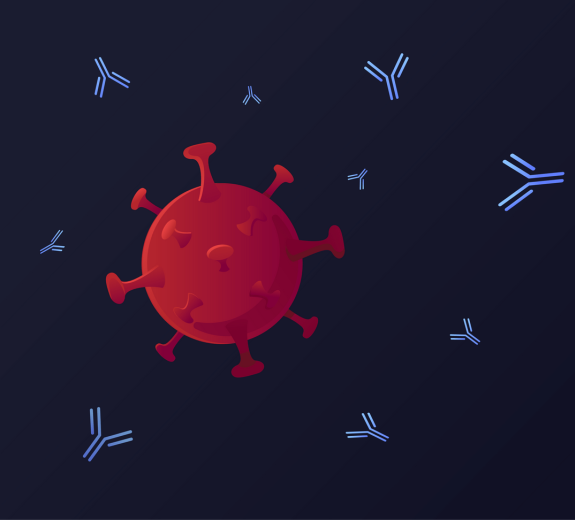What are monoclonal antibodies?
Monoclonal antibodies are proteins that can help the body fight off disease. Most antibodies produced as part of the normal immune response to an infection are “polyclonal.” This means they are made by several distinct B cells (immune system cells) and target different parts of a virus, bacteria or other infecting germ. To help treat disease, scientists can produce large quantities of an antibody from a cloned single B-cell in a laboratory. These are called monoclonal antibodies.
Monoclonal antibodies have been designed for many purposes:
-
To help the immune system fight off germs such as Ebola virus and respiratory syncytial virus (RSV)
-
To treat a variety of immunologic diseases and cancers
-
To target SARS-CoV-2, the virus that causes COVID-19
How does monoclonal antibody treatment for COVID-19 work?
Monoclonal antibody treatment for COVID-19 targets the spikes on the outside of the coronavirus. These spikes are proteins that enable the virus to bind with your cells and make you sick. Monoclonal antibodies can help stop the spike proteins from binding, rendering the virus unable to infect your cells. The therapy must be given early in the illness or just after exposure to the virus.
“We recommend that the antibodies be given as soon as possible after the diagnosis, ideally within 10 days of onset of symptoms,” Dr. Malhotra says. “Beyond that period, the disease may have progressed too far and other treatments will be more effective.”
What are the benefits of monoclonal antibodies for COVID-19?
In some COVID-19 patients, monoclonal antibodies can help prevent hospitalization and serious illness. They have also recently been approved for emergency use as “post-exposure prophylaxis,” meaning to help prevent an infection in someone who has been exposed to the virus within the prior seven days and is at high risk for complications.
“If we know that someone has had a high-risk exposure — which the CDC defines as being within six feet of an infected person for about 15 minutes or more over the course of a day — we may use this treatment to reduce their risk of infection as well as risk of complications if they become infected,” Dr. Malhotra says.
Can anyone infected with or exposed to COVID-19 receive monoclonal antibody treatment?
Doctors are currently using monoclonal antibodies for COVID-19 patients with mild to moderate illness (those not currently on oxygen or needing hospitalization), but who may be at high risk for complications because of:
-
Older age (65 years or more)
-
Pregnancy
-
Immunosuppressive disease or immunosuppressive treatment
-
Other co-existing health conditions, such as obesity, diabetes, kidney disease, heart disease and lung disease
A full list of conditions that put patients at higher risk can be found here.
“Antibodies may be particularly beneficial in patients who are immunocompromised, such as those who have had organ or bone marrow transplants or who are very elderly,” Dr. Malhotra says. “These patients might not produce an optimal response to a vaccine, so if they were to get an infection, monoclonal antibodies can help their immune system fight the virus.”
What’s the difference between monoclonal antibodies and the COVID-19 vaccine?
“First, I’m a big proponent of vaccines, everyone must get vaccinated,” Dr. Malhotra says, noting the rare exception for people with very specific allergies. “Vaccines enable the body to make antibodies so in the future, if our body encounters the virus, we’re more prepared to fight the infection. That’s really the best way to prevent infection, illness, hospitalization and death.”
Vaccines are a proactive and longer-term solution. If you come into contact with the virus and you’re fully vaccinated, your body is more prepared to fight the virus.
Monoclonal antibodies are a second line of defense and can help fight off the virus in people who are at higher risk for complications or who have not been vaccinated. By the time some patients realize they have COVID-19, they may be too sick to benefit from this treatment. Monoclonal antibodies also do not offer long-term protection and are not a substitute for vaccination. They boost a patient’s immune system for a few weeks, but then the antibodies fade away, leaving patients vulnerable to the virus once again.
What is a COVID-19 monoclonal antibody infusion center?
Monoclonal antibody infusion for centers for COVID-19 are dedicated spaces where people with the virus can receive this treatment. The therapy was initially given to COVID-19 patients in the emergency room, and some hospitals still use this approach. Other hospitals, including Virginia Mason, have started dedicated infusion centers for these patients.
“A lot of these patients are infectious and treating them in a separate space helps make sure there’s no exposure to other patients,” Dr. Malhotra says.




